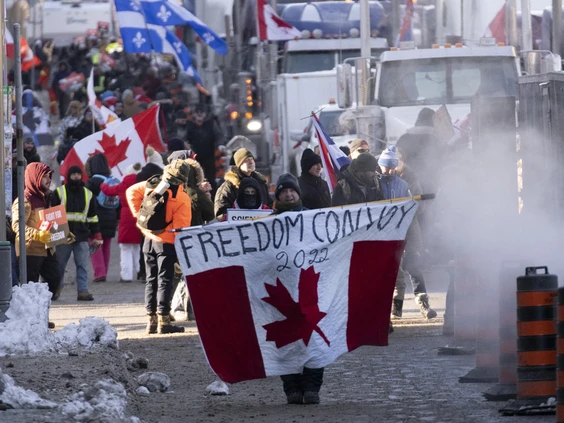
Federal Court rules Liberal government's use of Emergencies Act during 2022 Freedom Convoy protests unjustified and in violation of Charter. (Adrian Wyld/The Canadian Press Files)
The Federal Court has declared that the Liberal government's decision to invoke the Emergencies Act during the 2022 Freedom Convoy protests was not reasonable, unjustified, and a breach of the Charter. In a comprehensive ruling released on Tuesday, Federal Court Justice Richard Mosley determined that although the protests were causing economic harm to Canada, they did not pose a national security threat, as specified by the law.
Mosley supported the claims of civil liberties groups, including the Canadian Civil Liberties Association (CCLA) and the Canadian Constitutional Foundation (CCF), contending that the government overstepped its authority, violated the Charter, and lacked justification for invoking the Emergencies Act in February 2022.
The judge's decision highlighted the absence of reasonableness in the government's action, emphasizing the deficiencies in justification, transparency, and intelligibility. Mosley's written statement expressed his conclusion that the issuance of the Emergencies Act proclamation was neither reasonable nor justified.
Deputy Prime Minister Chrystia Freeland responded to the ruling on the same day, expressing disagreement with Mosley's decision and asserting the government's intention to appeal. Freeland maintained that the invocation of the Emergencies Act was necessary, citing threats to public safety and national security, including economic security, during the Freedom Convoy protests.
The ruling by Mosley emerged from four legal challenges filed by civil liberty groups, underscoring concerns raised by organizations like the CCLA and CCF. These groups argued that the Liberal government exceeded its authority when it activated the Emergencies Act on February 14, 2022, in response to the ongoing blockades staged by the Freedom Convoy in Ontario and Alberta.
The decision by the Federal Court is a significant development in the ongoing debate over the government's handling of the Freedom Convoy protests. It raises questions about the balance between maintaining public order and respecting civil liberties. While the government asserts the necessity of its actions to protect public safety and national security, the court's ruling signals a judicial opinion that the government's response was disproportionate and lacked the essential elements of reasonableness.
Despite the court's decision, the government remains steadfast in its stance, indicating an intention to contest the ruling through the appeals process. As the legal battle continues, the implications of this ruling on future invocations of the Emergencies Act and the broader landscape of civil liberties in Canada remain subjects of keen interest and scrutiny.















